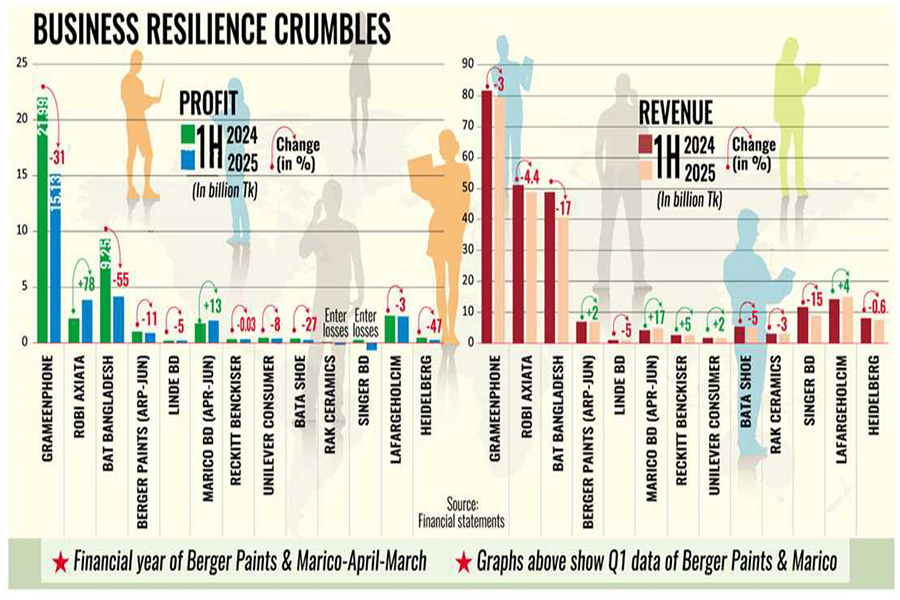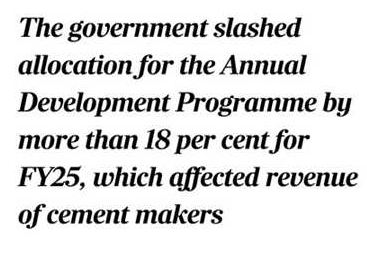
Published :
Updated :

Most multinational companies (MNCs) saw their profits erode in the first half of 2025, compared to the same period last year, largely due to high finance costs amid political uncertainty.
Economic activities have slowed down after the political changeover and that squeezed companies' profitability, according to market analysts.
"The broader macroeconomic backdrop, such as high inflation, has continued to pressure household budgets, limiting consumers' purchasing power and affecting demand across sectors," said Md Akramul Alam, head of research at Royal Capital, a top-tier brokerage firm.
Meanwhile, borrowing costs escalated as the government increased the policy rate to tame inflation, reining in the bottom-line growth of multinational companies that have huge bank loans.
From fast-moving consumer goods to cement and ceramics, manufacturers witnessed a decline in sales and profitability. Only the telecom operator -- Robi Axiata -- managed to withstand the storm by cutting down operating expenses in H1 2025.

Robi, among the 13 listed multinational firms, reported a 78 per cent higher profit for the January-June period this year, compared to the same period last year. Profits of eight other firms fell 3 per cent to 47 per cent year-on-year in the six months to June.
Singer Bangladesh and RAK Ceramics suffered the most in H1 this year as they went into the red, owing to high debt burden. They had made profits in the same period of the previous year.
Combined profits of these multinational companies plummeted 29 per cent year-on-year to Tk 27.8 billion while revenue dropped 6.0 per cent year-on-year to Tk 227 billion in the first half of the year, according to financial statements published by the companies.
The financial year for Berger Paints and Marico Bangladesh runs from April to March. So, Q1 data has only been taken into account to see how they have performed this year.
Berger Paints' profit dropped 11 per cent year-on-year in April-June while Marico secured a 13 per cent year-on-year growth in profit during the same period.
The country's manufacturing industries have been going through a hard time because of increased costs of raw materials and the overall economic situation, said Rupali Haque Chowdhury, president of the Bangladesh Association of Publicly Listed Companies (BAPLC).
Many companies could not adjust product prices to the rising input costs as high inflation had already weakened the purchasing capacity of consumers, said Ms Chowdhury, also managing director of Berger Paints.
Berger Paints also saw its tax expenses go up.
The Bangladesh Bank's tight monetary and fiscal measures after the political shift in August last year squeezed aggregate demand in the country.
Bangladesh's GDP grew 3.97 per cent in FY25, the slowest in 34 years, excluding the pandemic period, on the back of a sluggish growth of the agriculture and service sectors.
Moreover, private sector credit growth plummeted to multi-year low to 6.40 per cent in June, reflecting businesses' disinterest in taking loans amid high interest rates and political tension.
As the foreign firms operate in diverse sectors, factors behind profit erosion vary significantly from one company to another.
"The performance of multinational companies varies depending on their product lines. Consumption of less essential products was impacted due to inflationary pressure," said Mir Ariful Islam, managing director and CEO of Sandhani Asset Management.
Inflation had remained above 9.0 per cent for around 27 months to June this year, according to the Bangladesh Bureau of Statistics (BBS).
"Although inflation has started to decline, people's income has not increased," said Mr Islam.
Meanwhile, the government slashed allocation for the Annual Development Programme (ADP) by more than 18 per cent for FY25, which affected revenue of cement makers.
"The overall construction sector is under pressure in the face of high inflation. So, all construction-related firms have been impacted," said Mr Alam of Royal Capital.
Profits of Heidelberg Materials that produces cement under the brand name of Scan Cement plunged 47 per cent year-on-year in January-June this year.
LafargeHolcim Bangladesh's half-yearly profit also dropped 3 per cent year-on-year despite a 20 per cent year-on-year surge in profit in the first quarter to March this year.
"Profitability was partially impacted by rising energy costs, prompting cost-effective measures and price reviews," said Iqbal Chowdhury, chief executive officer of LafargeHolcim.
Singer cited a significant increase in finance costs and high import expenditures as factors behind losses. It also said it could not offset higher expenses by increasing product prices to remain competitive.
Singer, however, said higher production at its new manufacturing unit at Bangladesh Special Economic Zone (BSEZ) would help improve profitability at the end of the year.
BAT Bangladesh, the leading tobacco manufacturer, saw its profit plunge 55 per cent year-on-year in H1 while revenue slid 17 per cent during the period, compared to the same period of the year before, owing to higher operating expenses, lower sales and temporary closure of its Dhaka factory.
Among the listed MNCs, Grameenphone, BAT Bangladesh, Robi Axiata, Linde Bangladesh, Heidelberg Materials, and RAK Ceramics experienced a year-on-year decline in revenue in H1 this year- by 3-5 per cent.
In contrast, Berger Paints, Marico Bangladesh, Reckitt Benckiser, Unilever Consumer Care, Singer Bangladesh, and LafargeHolcim reported a year-on-year revenue growth -- between 2.0 per cent and 17 per cent.
Mr Alam said profit erosion of the foreign firms was relatively lower compared to local firms, backed by well management, brand value and price hike.
He hoped that these well-governed companies would do better in the coming months as some of the key economic indicators, such as foreign exchange reserves, inflation and remittance, started showing signs of recovery.
The government's fiscal and monetary policies are working and have helped cool inflation. "Once the macroeconomic situation improves, businesses will rebound," said Mr Alam.
"Political stability, macroeconomic improvement and consumer confidence are crucial for business in the coming months," said Mir Ariful of Sandhani Asset Management.
babulfexpress@gmail.com


 For all latest news, follow The Financial Express Google News channel.
For all latest news, follow The Financial Express Google News channel.